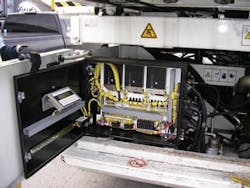Some friends and I were out in the sticks riding our dirt bikes. We decided to head back to camp after a long day of riding when suddenly, the trail split into three without signs to point the way. My park map did not show all of these trails and the GPS my buddy had was in “breadcrumb” mode, which showed us the long way back. So we came up with a game plan: We chose a trail, rode for about a mile then pulled over to check our progress by matching the GPS with the map. We were heading in the wrong direction! So we backtracked and eventually got on the correct trail. I then realized the wonders of modern technology working with older technology to save us time and resources—not to mention our hides.
Ground Support Equipment
With GSE, new technology is catching up whereas GSE had been lagging when compared to most other modern vehicles. With stricter air regulations, higher EPA standards and demands for efficiency and reliability, we are seeing more changes in engines and related components. Some engines that were workhorses for years are now obsolete. Diesel engines now have onboard computers that manage fuel and engine timing. Instead of the trusty old carburetors, cleaner burning fuel injection systems are now standard.
Now there are loaders that have computers and digital control panels that make these units perform quicker, safer and much more efficiently. Electric powered tugs and belt loaders, over generations of improvements, are more user-friendly and last longer between charges. I have even seen maintenance program software with GPS capabilities that can track a unit location and flag it when it is due for service, among other features. There have been and will continue to be many technological advancements in all GSE with the emphasis on electronics. I am reminded of Newton’s third law of motion, “For every action there is an equal and opposite reaction.” In this case, it would be the learning curve that everyone will go through.
Engineers will improve design and operation features. Operators will learn new controls and features. Mechanics will learn new systems in the electronics and computer field. And owners will learn the best-suited purchases of equipment, training and tools required to operate and maintain the equipment.
Maintenance and Repairs
The mechanics’ skill level will play a key role in maximizing the reliability and readiness of these newer types of equipment, so it is critical that they receive proper training and tools to keep up with advances. “Computerized engine management systems are electronically controlled, and sensors typically require at least a scan tool to identify trouble codes. A proficient mechanic almost without exception will require specialized training and tools to service and repair these vehicles,” says Doug Hobart, a 30-year experienced mechanic/GSE service manger at AP Enterprise SMF.
The modern mechanic will still need to have a clear understanding of basic engine operation and a increased knowledge of electronics and computers. He or she must not rely too heavily on the computer and forget the basics; like having a GPS is great, but you still should be able to read a map. The computer used to diagnose problems that may occur will point technicians in the direction of the problem, however they must use their skills to sort the information, not overlook the obvious and follow proper troubleshooting flows.
The Future
Whether it is fuel cell, fossil fuel or electric power, we will continue to see changes—mostly improvements—with every new generation of equipment. “At the recent GSE Expo in Las Vegas, I had a glimpse into the future, this being fuel cell vehicles. These vehicles are powered by water; actually they are hydrogen fuel cell powered. In short, water molecules are broken down into hydrogen and oxygen. The hydrogen is then used to power a generator used to power an electric motor; the by-product is then reintroduced to oxygen forming of all things ‘water’. This technology is very limited, at the time, but the sooner we learn to service this technology, the more likely we are to succeed,” Hobart says.
Seems what we are all searching for is equipment that is safer and more reliable, with greater fuel-efficiency and lower operating costs. I personally am searching for a GPS unit that has real-time off-road unmarked trails programmed into it, but until then I will still be packing a map.





